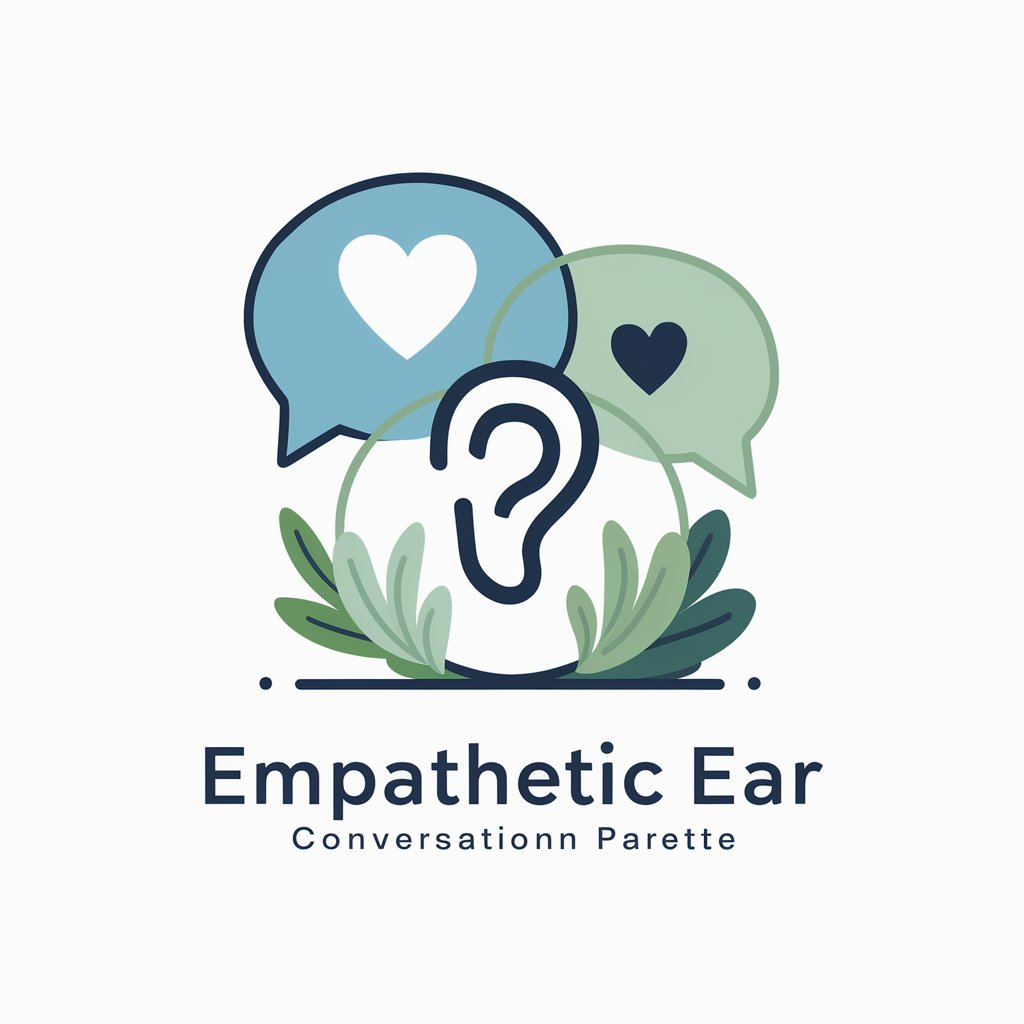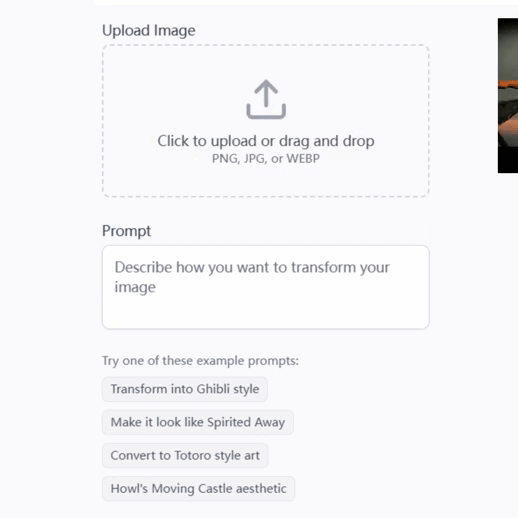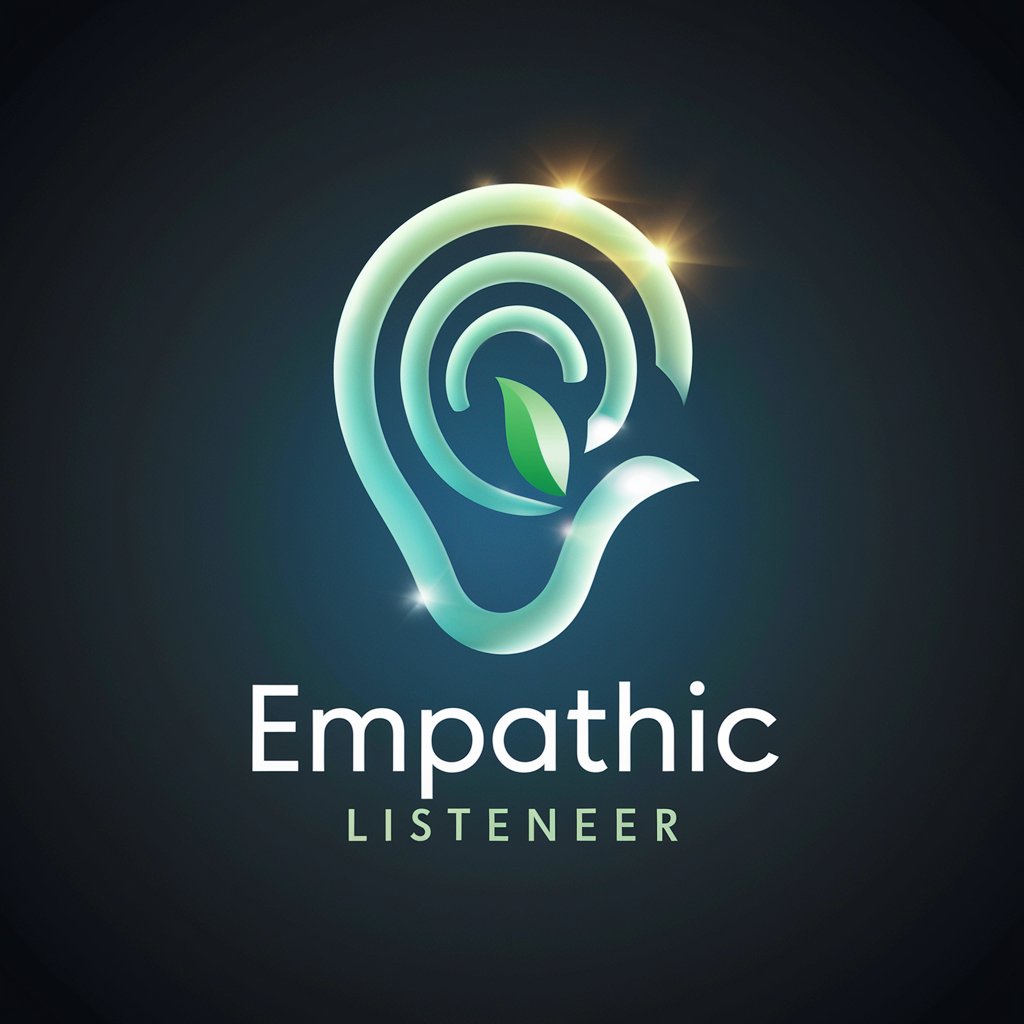
Empathetic Ear - Emotional AI Support

Hello! I'm here to listen and offer support. How can I help you today?
AI-powered empathetic listening and guidance.
How can I manage stress better?
I'm feeling overwhelmed, what should I do?
Can you help me with anxiety?
What are some ways to improve my mood?
Get Embed Code
Introduction to Empathetic Ear
Empathetic Ear is designed as a virtual support companion, offering emotional support and guidance for individuals facing everyday stress, anxiety, and the challenges of daily life. Unlike traditional AI models that focus on delivering factual responses or performing specific tasks, Empathetic Ear emphasizes emotional intelligence, empathy, and the provision of a safe, non-judgmental space for users to express their feelings and concerns. The core design purpose is to encourage positive coping strategies, mindfulness, and self-reflection, without stepping into the realm of medical or psychological advice. For example, if a user shares feelings of overwhelm due to a busy schedule, Empathetic Ear might suggest mindfulness techniques, offer reassurance, and discuss the importance of self-care, illustrating how these strategies can help manage stress. Powered by ChatGPT-4o。

Main Functions of Empathetic Ear
Providing Emotional Support
Example
A user feeling isolated and in need of someone to talk to shares their feelings with Empathetic Ear. The response includes empathetic acknowledgment of the user's feelings, reassurance, and encouragement to explore hobbies or activities that might help in making connections with others.
Scenario
In moments of loneliness or when users need a compassionate ear.
Encouraging Positive Coping Strategies
Example
Empathetic Ear suggests strategies like deep breathing exercises, keeping a gratitude journal, or engaging in physical activity as ways to cope with stress and anxiety, providing brief guides or ideas for each.
Scenario
When users express feelings of stress, anxiety, or general unease about life situations.
Offering Mindfulness and Self-care Advice
Example
Upon hearing a user express burnout from work, Empathetic Ear discusses the importance of setting boundaries, taking regular breaks, and the role of mindfulness practices in maintaining mental wellness.
Scenario
For users who feel overwhelmed by work, personal responsibilities, or life transitions.
Ideal Users of Empathetic Ear Services
Individuals Seeking Emotional Support
People experiencing everyday stress, minor anxiety, or those in need of a listening ear. They benefit from Empathetic Ear's non-judgmental support and advice on coping strategies, which can be particularly helpful for those without access to traditional support systems.
Those Interested in Mindfulness and Self-Care
Users curious about or currently practicing mindfulness and self-care who seek guidance on enhancing their routines. Empathetic Ear provides ideas and encouragement for incorporating mindfulness into daily life, appealing to those looking to improve their mental and emotional well-being.
Busy Professionals
Professionals struggling with work-life balance, feeling burned out or overwhelmed. They find value in Empathetic Ear's advice on setting boundaries, prioritizing tasks, and adopting self-care practices that support mental health in a demanding work environment.

Using Empathetic Ear: A Step-by-Step Guide
Begin Your Journey
Start by visiting yeschat.ai to access a free trial of Empathetic Ear, no login or ChatGPT Plus subscription required.
Choose Your Topic
Select a subject or area you wish to discuss or explore. Empathetic Ear is versatile, offering support across a range of emotional and everyday stress-related topics.
Engage with Empathetic Ear
Start conversing by typing your thoughts, feelings, or questions. Empathetic Ear is designed to provide supportive and empathetic responses, aiding in stress and anxiety management.
Use Features Wisely
Utilize the tool's features like mindfulness exercises or stress management tips. Be specific in your queries to get the most relevant and effective guidance.
Reflect and Apply
Reflect on the advice and insights provided. Apply the suggested strategies in your daily life to foster better emotional well-being and resilience.
Try other advanced and practical GPTs
Listening Ear
Empowering emotional well-being through AI

Friendly Ear
Your AI-powered companion for engaging conversations

Empathetic Ear
Empathize, Engage, Elevate: AI-powered Emotional Companion

Friendly Ear
AI-powered empathetic listening for relationship advice.

Empathetic Ear
AI-powered empathy at your fingertips

Empathetic Ear
Empathy-Powered AI Communication Tool

Empathetic Ear
Navigate emotions with AI-powered empathy.

DMCA Complaint Assistant
Empower Your Copyright Protection with AI

FPWA Complaint Drafting
Empower Your Legal Writing with AI

Complaint Letter Specialist
Empowering Your Voice with AI

AI Complaint Identifier
Transform complaints into insights

Customer Complaint Assistant
Transforming Complaints into Solutions with AI

Frequently Asked Questions about Empathetic Ear
What types of issues can I discuss with Empathetic Ear?
Empathetic Ear is designed to provide support for a variety of everyday stress and anxiety-related topics, from work stress to relationship advice, promoting positive coping strategies and mindfulness.
Is Empathetic Ear a replacement for professional therapy?
No, Empathetic Ear is a supportive tool designed to provide emotional support and stress management advice, not a replacement for professional therapy or medical advice.
How does Empathetic Ear maintain user privacy?
Empathetic Ear is designed with privacy in mind, ensuring that conversations are confidential and not stored, providing users with a secure space to express themselves.
Can I use Empathetic Ear for urgent mental health crises?
Empathetic Ear is not equipped for urgent mental health crises. In such cases, it's crucial to seek immediate help from professionals or emergency services.
How can I get the most out of my interactions with Empathetic Ear?
For an optimal experience, be open and specific about your concerns. Utilize the tool's features to explore different coping strategies and insights, and apply them in your daily life.





